Woman With Autistic Son Calls Friend Ableist After Refusing To Give Her Positive Reference For Dog Rescue
Rescuing a dog from a shelter can be one of the most rewarding experiences in life. Knowing that you helped your dog transition from a challenging living situation into a more comfortable and happy environment is incredibly fulfilling. However, this transition is often fraught with difficulties, as many shelter dogs come with significant emotional baggage that can complicate the process. According to Dr. Madeline Levine, a child psychologist, "Understanding the emotional needs of both the pet and the family is essential, particularly when children are involved." This highlights the importance of ensuring that these dogs are placed in homes where their healing process can be supported. The worst thing you could do to these rescues is interfere with their recovery, which could lead to harmful consequences for everyone involved. In a recent discussion, a Reddit user shared their dilemma about refusing to give a friend a positive reference for a dog rescue due to concerns about the friend's adult autistic son potentially mishandling the dog. The community's reactions underscored the potential dangers of such a situation, with many agreeing on the need for careful consideration.
Here's the original Reddit post from u/Expensive_Assist_616:
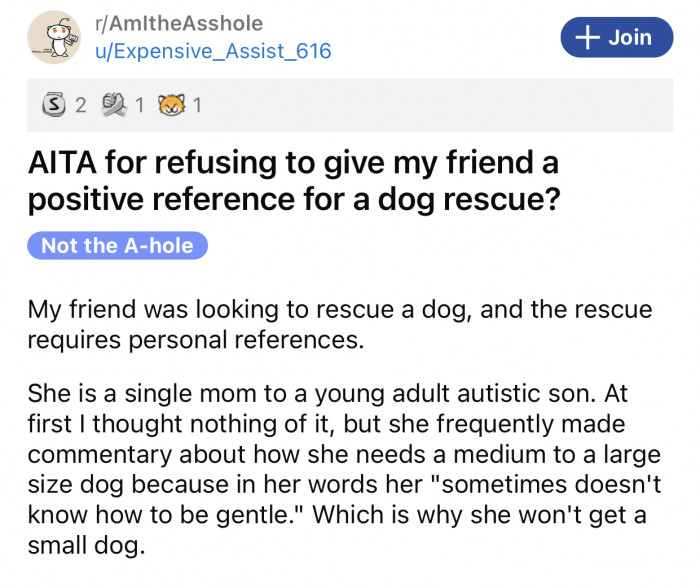
u/Expensive_Assist_616 was unsure whether they did the right thing by refusing to give her a reference.

Here's how Reddit users reacted to u/Expensive_Assist_616's situation:

Understanding the Impact of Autism on Relationships
Research indicates that autism can significantly affect interpersonal relationships, often leading to misunderstandings and misinterpretations of social cues.
Studies show that individuals with autism may struggle with behaviors considered socially inappropriate, which can inadvertently affect their relationships with family and friends.
In this context, the mother's perception of her friend's refusal to provide a positive reference may stem from feelings of vulnerability and protectiveness toward her son.
Understanding Defensive Coping Mechanisms
In situations of perceived judgment or rejection, individuals often resort to defensive coping mechanisms. This is especially true for parents of children with autism, who may already feel vulnerable due to societal stigma and misunderstanding.
Research indicates that these defensive behaviors are rooted in earlier experiences where self-protection became necessary for emotional survival. Dr. Lisa Wang from Northwestern University emphasizes that these patterns, while sometimes maladaptive, serve a purpose in shielding individuals from further emotional pain.
Understanding the Impact of Autism on Relationships
Dr. Emily Carter, a clinical psychologist specializing in developmental disorders, notes that the challenges faced by families with autistic members can deeply affect social dynamics.
Research shows that social communication difficulties, characteristic of autism, can lead to misunderstandings and strain in friendships.
Understanding these dynamics is crucial; it allows friends and acquaintances to approach situations with empathy rather than judgment.
Adding the kid to the equation makes it even more reasonable.

They have every right to defend themselves, it's just the way it is.

It seems that it's pretty obvious that she is the one in the wrong, OP's concerns are 100% valid.
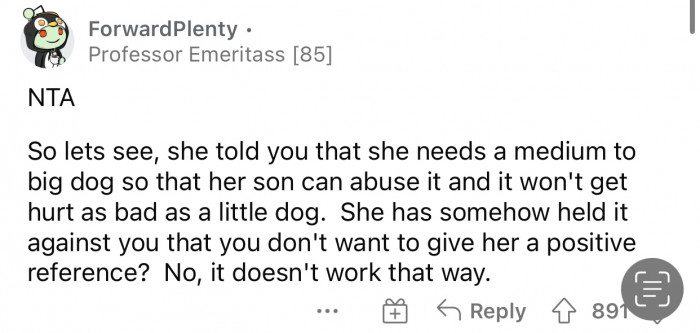
A clinical psychologist specializing in autism explains that the mother’s reaction might reflect a heightened sensitivity to perceived judgment and criticism regarding her son's behavior.
When caregivers have children with conditions like autism, they often develop a strong sense of advocacy, which can lead to defensive responses when they feel their child is being unfairly judged.
This emotional investment can make it challenging for parents to navigate social dynamics where their child's needs and behaviors are involved.
When faced with the possibility of negative feedback, the brain can trigger a fight-or-flight response, overwhelming rational thinking. A clinical study published in the Journal of Abnormal Psychology underscores how stress can impair decision-making, causing individuals to react defensively rather than reflectively.
This reaction is not just a personal flaw; it’s a deeply wired response that has evolved as a survival mechanism.
From a psychological perspective, ableism often manifests as a lack of awareness surrounding the challenges faced by individuals with disabilities.
This ignorance can lead to hurtful comments or actions, which in turn can exacerbate feelings of isolation for families like the one discussed in the article.
Studies indicate that when people are educated about autism and its manifestations, social acceptance increases, promoting healthier relationships.
It's basically a recipe for disaster, you just cannot ignore the potential dangers.

She tried to shame OP into referencing her, which is quite manipulative.

Yeah, that would be the reasonable thing to do.

The Role of Ableism in Social Interactions
Ableism—the discrimination against individuals with disabilities—can deeply influence social interactions and relationships.
According to a study published in the Journal of Social Issues, ableist attitudes can lead to social isolation for individuals with disabilities and their families.
This dynamic suggests that the mother's friend's reluctance to support the dog rescue may reflect broader societal biases, impacting the mother’s emotional well-being.
The Role of Empathy in Conflict Resolution
Empathy plays a crucial role in resolving interpersonal conflicts, particularly when misunderstandings arise. Research shows that when both parties strive to understand each other's emotional experiences, the likelihood of a constructive outcome increases significantly.
Practices such as active listening and expressing validation can create a safe space for dialogue, reducing the defensiveness often seen in emotionally charged situations.
The Role of Empathy in Conflict Resolution
Empathy is a crucial skill in navigating conflicts, particularly in emotionally charged situations.
According to research published in the Journal of Personality and Social Psychology, empathy can significantly reduce defensiveness and promote understanding between parties.
For friends and family, showcasing empathy can transform interactions, leading to more supportive environments for individuals with autism.
There are a lot of factors that need to be considered...
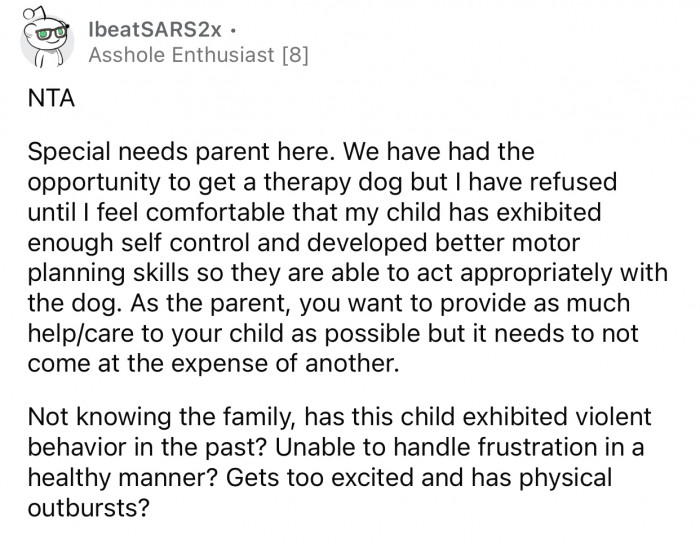
Well, the mother did say that he "sometimes doesn't know how to be gentle."

That's pretty much the biggest red flag.
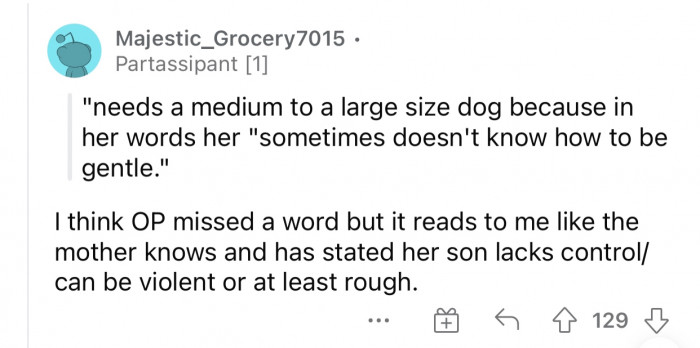
Understanding these dynamics can empower the mother to address the situation with her friend more constructively.
Effective communication strategies, such as expressing her feelings and explaining her son's needs, can help bridge the understanding gap.
Research in effective communication highlights that sharing personal experiences can foster empathy and promote more supportive relationships.
Furthermore, creating a supportive environment can foster open communication. According to Dr. Ramani Durvasula, clinical psychologist, "Emotional intelligence is crucial in navigating interpersonal relationships. Those who can manage their emotions effectively are more adept at resolving conflicts." Encouraging honest discussions about feelings and fears can bridge gaps and enhance mutual understanding.
Behavioral analysts emphasize the importance of clear communication, especially when discussing sensitive topics like autism.
Studies show that using 'I' statements can minimize defensiveness and promote understanding, helping individuals express their feelings without blaming others.
For example, saying 'I feel concerned when my son interacts roughly' is more effective than accusing someone of being insensitive.
This is also a valid point, you cannot generalize.
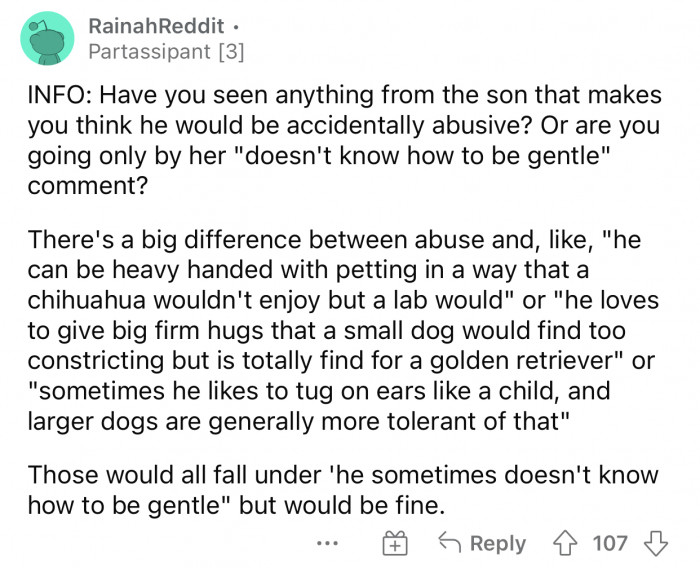
Asking more questions would be the way to go in this situation.
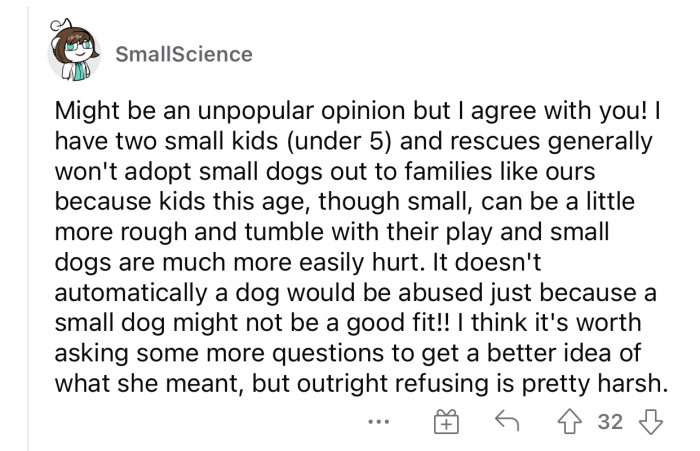
This reference could have bad consequences, and better safe than sorry.
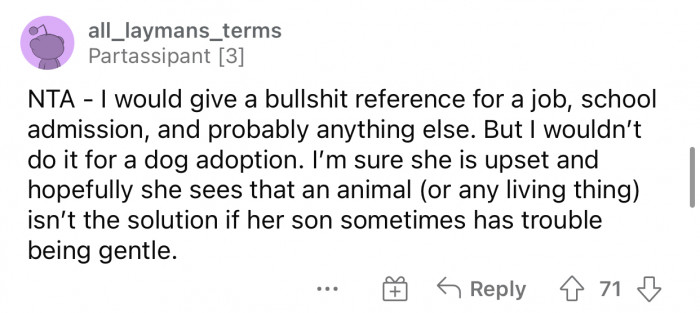
Navigating Friendships in the Context of Disability
Friendships can be particularly challenging when navigating the complexities of disability and societal perceptions.
Dr. Emily Johnson, a social psychologist, highlights that friends may not fully understand the implications of autism, leading to unintentional harm in their interactions.
Building educational bridges about autism can be a proactive way to enhance understanding and support among friends.
The Impact of Stigma on Parenting
Parents of children with autism often face societal stigma, which can exacerbate feelings of isolation and defensiveness. This stigma can manifest in various forms, including judgment from peers or family members regarding their parenting choices.
According to research from the Journal of Child Psychology and Psychiatry, stigma not only affects parents' mental health but can also impact their children’s emotional and social development.
Coping Strategies for Families
Families dealing with autism often require additional coping strategies to navigate social situations effectively.
Therapists recommend building a strong support network, which can include therapy groups or community resources that focus on autism.
Research from the American Psychological Association indicates that social support significantly reduces stress and enhances family resilience.
She could find other alternatives that don't involve her friend at all.
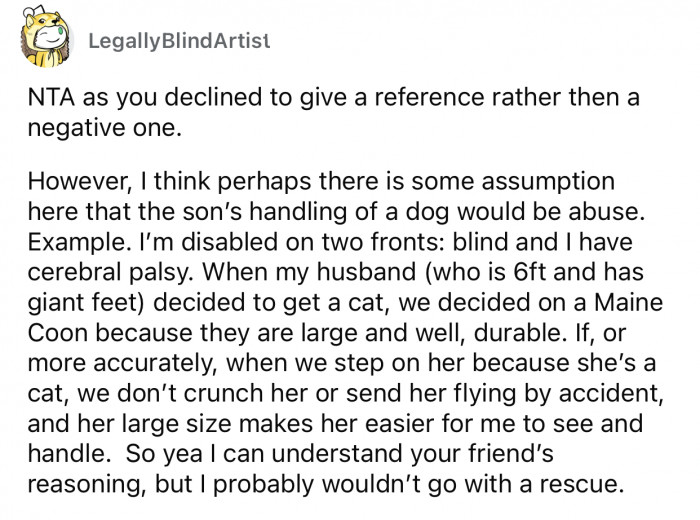
Trained dogs could be more suitable in this situation.

Dog breeds are different and they all enjoy different things.

To counteract stigma, it's vital for parents to seek community support. Building a network of understanding peers can provide a buffer against negative societal perceptions, fostering resilience in both parents and children.
Engaging in support groups or forums where experiences and strategies can be shared can significantly alleviate feelings of isolation.
Understanding the emotional landscape is essential for friends to foster supportive relationships with families of autistic individuals.
Research indicates that emotional intelligence plays a significant role in facilitating healthy interpersonal relationships.
By improving emotional intelligence, friends can learn to respond more compassionately and effectively to the needs of those with autism.
This should also be put into consideration.
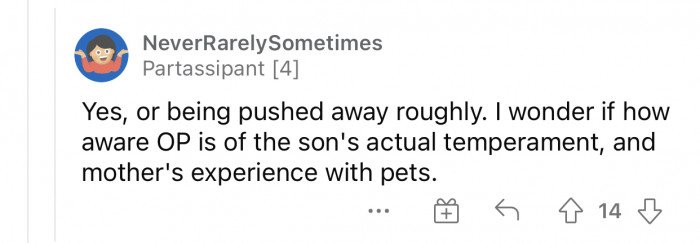
It all depends on the kid's behavior, we need more detail.
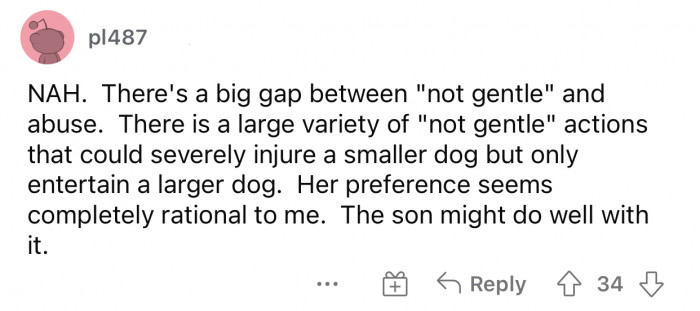
It's always better to take precautions.

Strategies for Managing Emotional Responses
When dealing with stressful interpersonal situations, emotional regulation techniques can be incredibly beneficial. Practices such as mindfulness and deep-breathing exercises can help individuals manage their emotional responses effectively.
Research from the National Institute of Mental Health shows that regular practice of these techniques can lead to decreased anxiety and improved emotional resilience.
Advocating for Awareness and Acceptance
Advocacy for autism awareness is vital in creating a more inclusive society.
Studies show that educational programs can significantly improve public knowledge about autism, leading to increased acceptance and reduced stigma.
Encouraging open dialogues about autism can empower families and friends to address misconceptions and promote understanding.
Special care and attention, so why put it in potential danger.

It's not ableist, it's just precautionary.
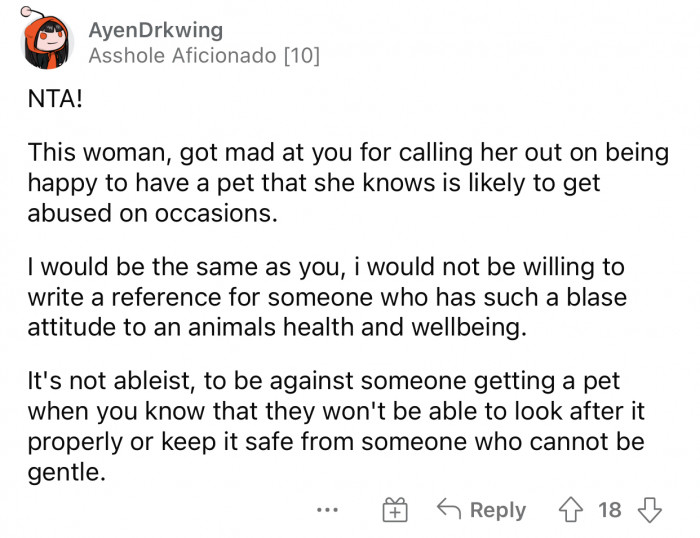
It's a legitimate concern about the safety of another being.
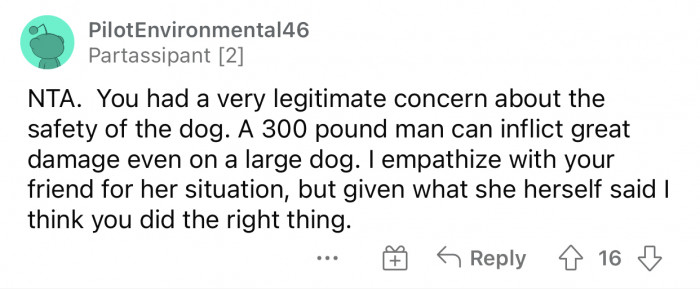
Additionally, cognitive-behavioral strategies can assist individuals in reframing their thoughts during challenging interactions. Rather than reacting impulsively, individuals can learn to pause and assess the situation more objectively.
This shift in perspective can break the cycle of defensiveness and lead to more constructive outcomes.
Addressing ableism requires ongoing effort and commitment from both sides of any friendship.
Research suggests that continuous learning and discussions about disabilities can foster empathy and compassion, enhancing relationships over time.
Ultimately, understanding and acceptance lead to stronger bonds and healthier interactions.
In a world full of injustice and abuse, being extra careful when it comes to making sure that a defenceless animal will be treated properly is very important, because why take that risk? It's always better to be safe than sorry.
Especially considering the fact that shelter animals often come with serious emotional baggage that you cannot just ignore or help worsen. These animals need to be treated properly and gently so they can recover from their terrible past lives, if not, why even bother "rescuing" them if you're not planning to do any rescuing.
According to the information that was provided above, it seems like OP is definitely NTA.
Psychological Analysis
This situation highlights the critical importance of empathy in social interactions, especially when navigating the complexities of relationships affected by autism.
Our understanding of these dynamics can help reduce stigma and encourage more compassionate responses, ultimately benefiting everyone involved.
Analysis generated by AI
Analysis & Alternative Approaches
Research from various psychological perspectives underscores the importance of empathy and understanding in navigating relationships involving autism.
As highlighted in numerous studies, fostering awareness and acceptance is key to breaking down the barriers of ableism and promoting supportive communities.
The Importance of Mutual Respect
In any relationship, mutual respect is foundational. When individuals feel respected, they are less likely to react defensively and more likely to engage in productive dialogue.
Fostering an environment where each party acknowledges the other's perspective can mitigate conflicts and promote understanding.
Analysis & Alternative Approaches
Conflict resolution is complex, particularly when emotions run high. However, research consistently shows that with the right tools and support, individuals can navigate these challenges more effectively.
Understanding the psychological underpinnings of defensive behavior is crucial for fostering healthier relationships. Ultimately, it’s about creating a dialogue that prioritizes empathy, respect, and mutual understanding.
Analysis & Alternative Approaches
Ultimately, fostering empathy and understanding in friendships is crucial for maintaining supportive relationships.
According to Dr. John Gottman, a renowned marriage researcher, "The ability to communicate openly about difficult subjects is essential for building strong relationships." He emphasizes that open dialogues about disabilities can lead to more inclusive social environments, benefiting everyone involved.



